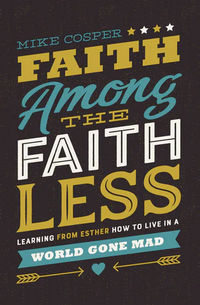 |
Faith Among the Faithless:
|

What’s Faith Among the Faithless About?
This is hard to sum up briefly, but I’m going to give it a shot—we live in a compromised age, society is changing, shifting—it’s difficult to predict what the next few years are going to look like, but one thing is certain: Western Culture, particularly that of the U. S., isn’t going to look anything like it did before. How is the Christian to react?
Many hold up Daniel as the model of how to behave in a culture hostile to the Faith. Cosper thinks he’s the wrong model
…there’s a problem with looking to Daniel: Most of us aren’t a Daniel. In fact, we are far from it. As much as we recognize that our culture is in decline, we also kind of . . . like it. Christians in general consume as much mass media and are as addicted to pornography, as likely to divorce, as consumeristic, and as obsessed with social media as the rest of our world. Again: we’re immersed in a secular age, and it’s had a profound effect upon us…while [Daniel is] a great model of faithfulness, I’m not sure he’s the best reference point for most of us.
Instead, he suggests we look to Esther.
…her story is more complicated than [the storybook versions we’re used to]. And much darker. It’s less VeggieTales and more Game of Thrones, with a lot more sex, murder, and impaling than the usual version of the story would imply. (There’s actually quite a bit of impaling.) Mordecai and Esther’s motivations are sometimes murky and sometimes blatantly self- serving.
As in Esther’s day, the Church is compromised, we’ve taken on a lot of the World’s values, and we should look for people in the Bible who find themselves in that situation rather than men like Daniel.
Esther’s story reveals a way forward in a culture where people of faith find themselves at the margins of society. She neither clutches for power nor seeks self- protection. Instead, she faces reality, embraces weakness, and finds faith, hope, and help from a world unseen…Her story is also an invitation to those whose faith, convictions, and morality are less than they wish they were.
When we examine Esther, we see that
…the story is a reminder that God doesn’t abandon his people, no matter how dark their circumstances, how compromised their hearts are, or how hidden he may seem.
So Cosper examines the Biblical account, retelling the story in a very non-Sunday School way and uses that to illustrate the situations that believers may find themselves in and how we can learn from Esther and Mordecai (both positively and negatively) in our cultural moment.
I’m going to end up writing twenty thousand words if I don’t cut myself short, so I’m going to do that.
So, what did I think about Faith Among the Faithless?
Whatever happens in the years and decades to come, we can be sure that faithfulness looks pretty much like it did three thousand years ago. Sometimes it looks like Daniel: a steady path of spiritual formation and obedience. But sometimes, and perhaps more often than not in the world we occupy today, it looks more like Esther: a path of awakening, risk, vulnerability, and, ultimately, hope.
This book is told in an easy, breezy style—full of wit, and wisdom. Cosper knows how to communicate engagingly and clearly. I walked away thinking Cosper would be a fun guy to talk books, TV, and The Bible with. But that style doesn’t belie the seriousness of the material, this is a high-stakes situation, and he’s fully aware of that. But Cosper uses his style to connect to the audience, not to sugarcoat anything.
It’s clear that Cosper has done his research on the book—I wish he’d shared more of his homework in footnotes for the reader. Not necessarily to check his work, but to expand on it—to get a greater appreciation for what he summarized.
Do I agree with every jot and tittle? Of course not. But there’s a lot to appreciate here, and more to chew on, to reflect on, and to learn from. There’s hope in the darkness—and Cosper is good to point the reader to it. It’s not because we’re morally strong and faithful like Daniel, nor does it come from the weakness that characterized Esther’s early life and then the ways she found to do the right thing. The hope of the book of Esther is that the Lord is faithful when we are not, and he will provide for His people.
I do recommend this book, it’ll entertain you and then make you think as well as pray.

This post contains an affiliate link. If you purchase from it, I will get a small commission at no additional cost to you. As always, opinions are my own.
![]()

